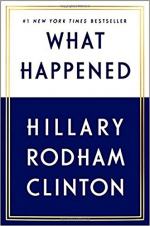|
This section contains 586 words (approx. 2 pages at 400 words per page) |

|
What Happened Summary & Study Guide Description
What Happened Summary & Study Guide includes comprehensive information and analysis to help you understand the book. This study guide contains the following sections:
This detailed literature summary also contains Topics for Discussion on What Happened by Hillary Rodham Clinton.
The following version of this book was used to create this study guide: Clinton, Hillary Rodham. What Happened. Simon & Schuster, 2017.
What Happened by Hillary Rodham Clinton is an account of the 2016 American Presidential election. Clinton provides her perspective on the campaign, its events and why she eventually lost to Donald Trump. She notes that her narrative is not intended to be exhaustive, but rather to contribute her impressions to the broader conversation about the election and the future of American democracy.
The book opens at Donald Trump’s inauguration, which Clinton attended out of a sense of duty and adherence to democratic norms. This event, like the months following the election, was difficult for Clinton as she tried to both comfort her supporters and address her own pain at having lost.
The text then shifts to the beginning of the campaign and Hillary’s decision to run. Despite widespread speculation, she argues that this decision was not inevitable. She was enjoying life as a private citizen and thought she was making important contributions to the welfare of others through her work at the Clinton Foundation. Eventually, her husband Bill and Barack Obama convinced her that she would be the best person for the job and should run.
The campaign started with a number of small events, designed to give Clinton the opportunity to listen to the problems and challenges faced by Americans so that she could later formulate and propose solutions. Even at this point, she knew that she would have significant difficulty presenting as a change candidate, something often sought by voters, given that she would be running for a third Democratic term. Clinton also argues that her identity as a woman played an important role in her political career and in this election. She considers her participation in the women’s movement to be the defining element of her biography. Further, she believes that she and other women have a unique, though under-appreciated role, in the political system. Simultaneously, Clinton believes that sexism, particularly in manifestations that are not readily apparent, continues to play an important role in American society.
Clinton goes on to discuss the major reasons she believes her candidacy surprisingly failed. She notes that she has always approached governance in a very pragmatic way and takes great interest in the minute details of public policy. This election, however, was devoid of any significant analysis of the candidates’ competing proposals, depriving Clinton of one of her major strengths and preventing voters from being fully informed. Instead, news organizations' focus on a series of sensationalized controversies, most notably Hillary’s use of a private email server while Secretary of State, erroneously gave the impression that she was corrupt and secretive. Clinton argues that the election ultimately turned on a string of unprofessional actions by FBI Director James Comey that unfairly shifted public opinion against her in the final days of the campaign. She does, however, accept ultimate responsibility for her loss as the candidate. Additionally, voters’s frustration and desire for radical change made the election close enough that Comey’s decisions could have an impact.
The book concludes with a brief discussion of the role of empathy and love in American society. Clinton believes that, despite the country’s prosperity, it has long suffered from a spiritual void and a lack of connectedness among its people. She argues that there is no easy answer for this problem, but she intends to work toward addressing it while remaining involved in politics.
Read more from the Study Guide
|
This section contains 586 words (approx. 2 pages at 400 words per page) |

|



